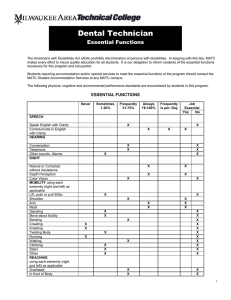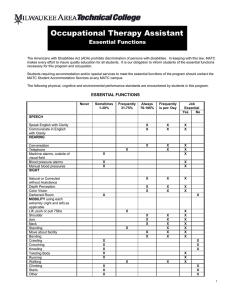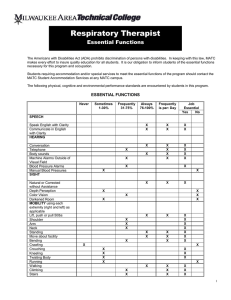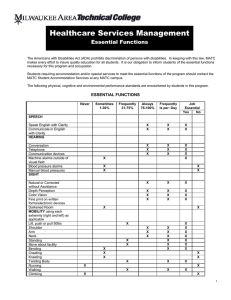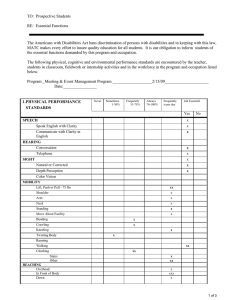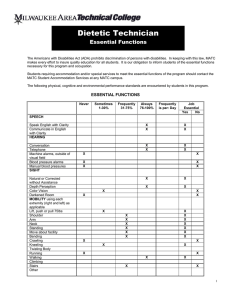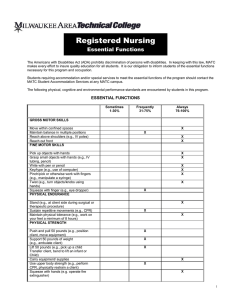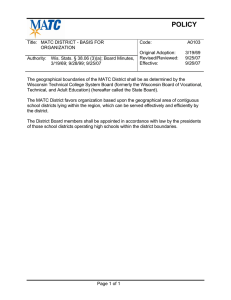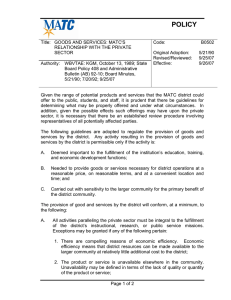The Americans with Disabilities Act (ADA) prohibits discrimination of persons...
advertisement
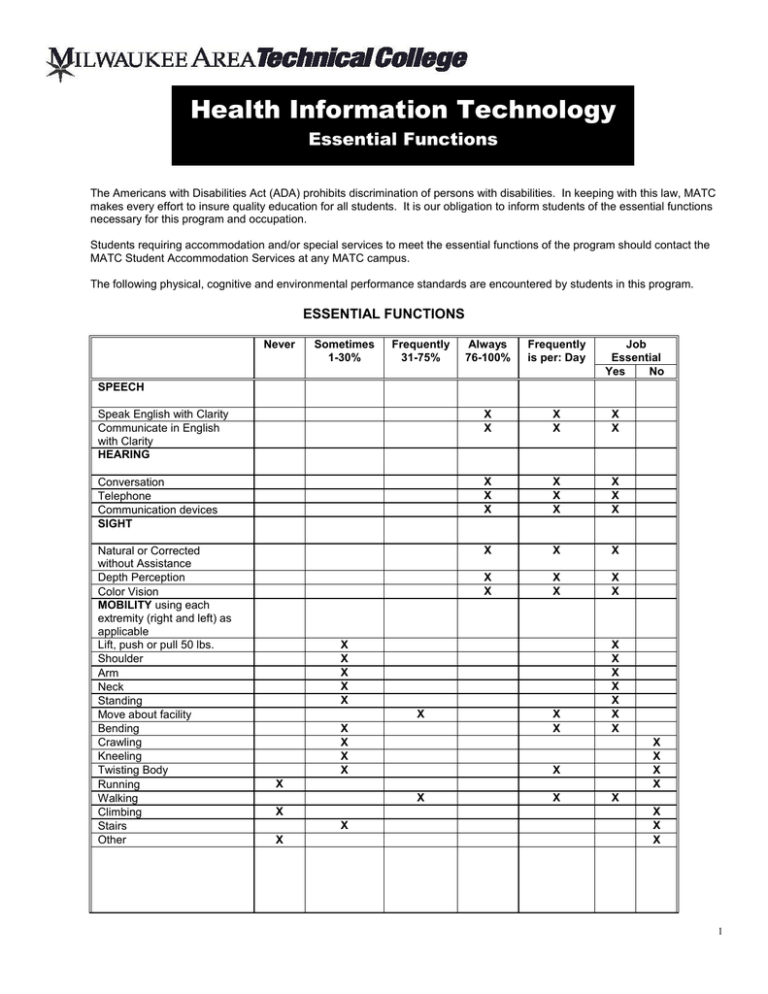
Health Information Technology Essential Functions The Americans with Disabilities Act (ADA) prohibits discrimination of persons with disabilities. In keeping with this law, MATC makes every effort to insure quality education for all students. It is our obligation to inform students of the essential functions necessary for this program and occupation. Students requiring accommodation and/or special services to meet the essential functions of the program should contact the MATC Student Accommodation Services at any MATC campus. The following physical, cognitive and environmental performance standards are encountered by students in this program. ESSENTIAL FUNCTIONS Never Sometimes 1-30% Frequently 31-75% Always 76-100% Frequently is per: Day Job Essential Yes No Speak English with Clarity Communicate in English with Clarity HEARING X X X X X X Conversation Telephone Communication devices SIGHT X X X X X X X X X Natural or Corrected without Assistance Depth Perception Color Vision MOBILITY using each extremity (right and left) as applicable Lift, push or pull 50 lbs. Shoulder Arm Neck Standing Move about facility Bending Crawling Kneeling Twisting Body Running Walking Climbing Stairs Other X X X X X X X X X X X X X X X X X X SPEECH X X X X X X X X X X X X X X X X X X X X X X X X X 1 Never Sometimes 1-30% Frequently 31-75% REACHING using each extremity (right and left) as applicable Overhead In front of Body Down GRASPING Overhead In front of Body Down SITTING Always 76-100% Frequently is per: Day Job Essential Yes No X X X X X X X X X X X X X X X X X X X X X SMELLING X X TASTING X X FINE MOTOR CONTROL (working with small objects and using each hand (right and left) Hands Fingers/Tactile Sense (the ability to feel when touching) Wrist COORDINATION Eye/Hand with both hands/arms Eye/Hand/Foot with both hands/arms/feet ALLERGIES/SENSITIVITIES X X X X X X X X X X X X X X X X Tolerance to Latex COGNITIVE/MENTAL FACTORS REASONING Deal with abstract and concrete variables, define problems, collect data, establish facts, and draw valid conclusions Interpret instructions furnish in oral, written, diagrammatic, or schedule form Deal with problems varying from standard situations Carry out simple to complex writing and oral instructions Carry out at least one or two step instructions MATHEMATICS Complex skills – Business math, algebra, geometry or statistics Simple skills – add, subtract, multiply and divide whole numbers and fractions, calculate time and simple measurements X X X X X X X X X X X X X X X X X X X 2 Never Sometimes 1-30% Frequently 31-75% Always 76-100% Frequently is per: Day Job Essential Yes No Complex skills - comprehend medical records, manuals, journals, instructions in use and maintenance of equipment, safety rules and procedures and drawings Simple skills – English sentences containing subject, verb and object; manes and addresses, complete job application or notations in a log book WRITING X X X X X X Complex skills – prepare medical documentation, report summaries using prescribed and conforming to all rules of punctuation, spelling, grammar, dictation and style Simple skills – English sentences containing subject, verb and object; names and addresses, complete job application or notations in a log book PERCEPTION X X X X X X X X X X X X X X READING Spatial – ability to comprehend forms in space and understand relationships of plane and solid objects; frequently described as the ability to “visualize” objects of two or three dimensions, or to think visually of geometric forms. Form – ability to perceive pertinent detail in objects or in pictorial or graphic material; to make visual comparisons and discriminations and see slight differences in shapes and shadings of figures and widths and lengths of line CLERICAL Ability to perceive pertinent detail in verbal or tabular material; to observe differences in copy, to proof-read words and numbers, and to avoid perceptual errors in arithmetic computation. X 3 Never Sometimes 1-30% Frequently 31-75% Always 76-100% Frequently is per: Day Job Essential Yes No DATA X Synthesizing Coordinating Analyzing Compiling Computing Copying Comparing PERSONAL TRAITS Ability to respond to requests person to person and over the telephone in a timely manner Ability to comprehend and follow instructions Ability to perform simple and repetitive tasks Ability to maintain a work pace appropriate to a given work load Ability to relate to other people beyond giving and receiving instructions Ability to influence people Ability to perform complex or varied tasks Ability to make generalizations, evaluations or decisions without immediate supervisor Ability to accept and carry out responsibility for direction, control and planning ENVIRONMENTAL FACTORS Work indoors Work outdoors Working in confined spaces Using computer monitor Works alone Works around others Works with others X X X X X X X X X X X X X X X X X X X X X X X X X X X X X X X X X X X X X X X X X X X X X X X X X X X X X X X X X X X X X X X 4
